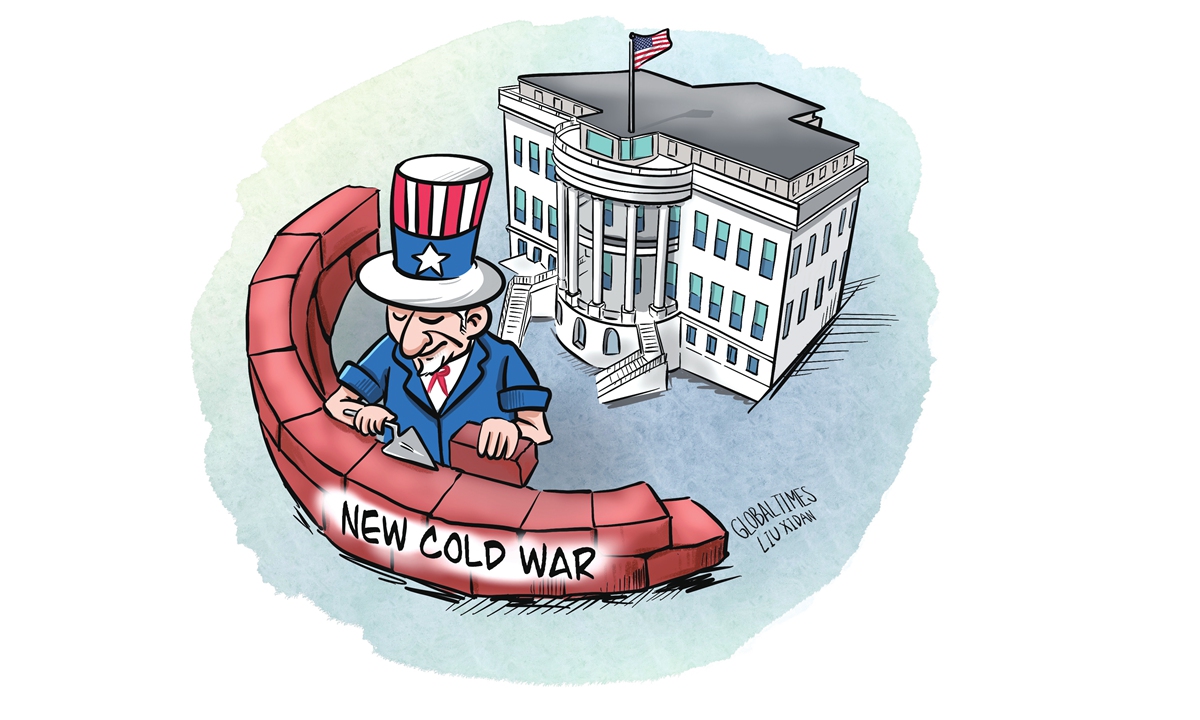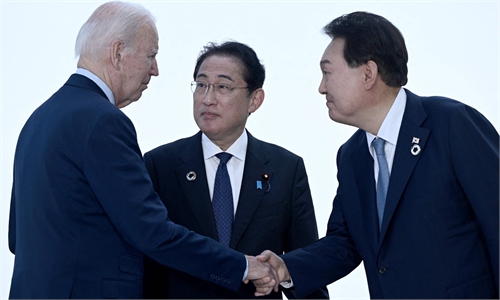
Illustration: Liu Xidan/GT
Editor's Note:The China-US bilateral relationship is one of the most important in the world. The trajectory of this relationship has attracted international attention. Still, the US is stepping up efforts to suppress China on various fronts such as politics and diplomacy, economy, trade, technology, and military security, showing the true meaning of a cold war. The Global Times invites Chinese and foreign experts to expose the US' manipulation of the new cold war and reveal the damage it may potentially do to the world.
This is the first article of the series.
With the release of the Biden administration's National Security Strategy on October 12 last year, the US has unilaterally initiated a "new cold war" against China.
The "new cold war" shares four similarities with the "old cold war," which lasted from the 1940s to the early 1990s. First, it establishes a single global adversary. Back then, it was the Soviet Union; now, it's China. The new version of the US National Security Strategy explicitly states that China is the only competitor with the intent to reshape the international order. It also identifies China as "America's most consequential geopolitical challenge."
Second, it involves comprehensive domestic and international mobilization. Domestically, it is about ideological demonization of China, with an increasing number of US politicians seeking political capital by attacking China, while rational voices advocating for fair discourse on China are marginalized. Internationally, the US aims to construct an Asia-Pacific "mini NATO," focusing on promoting Japan-Korea reconciliation, enhancing cooperation between Japan, South Korea and Australia, and building a "3+N" model with other countries around this core. Additionally, there are efforts to push for NATO's expansion into the Asia-Pacific region and to coerce neutral countries to take sides or engage in subversive actions, such as attempting to form the CHIP4 alliance for semiconductors.
Third, it attempts to pile comprehensive pressure on China. In the past, certain US government departments occasionally diverged from the White House's stance due to specific interests, but now such divergence is nearly nonexistent. The US is forming a whole-of-government approach to contain China.
Fourth, the US strives to avoid a hot war while applying pressure across all fronts. During the "old cold war," the US attempted détente with the Soviet Union. Now, similarly, the US emphasizes the need for "guardrails" in the China-US relationship. This is because the US understands that the costs of an actual hot war would be immense.
Based on these shared characteristics and logic, the "new cold war" is rather initiated unilaterally by the US. One key factor is that China consistently rejects the notion of a "new cold war" and refuses to let the world slide into one. Faced with US provocation and aggressive suppression, China's defensive strategy is also at play.
Moreover, the US is facing challenges both domestically and internationally. Within the US, major corporations generally maintain a rational attitude toward China. Recently, some top executives from American companies have visited China, despite pressures from the US government and anti-China politicians. This signifies that a portion of American society, including the business sector, is not fully complying with Washington's anti-China mobilization. Internationally, the interdependence between China and the US is much stronger compared to the US-Soviet era. Major European countries are reluctant to blindly follow the US on its China policy, and almost all ASEAN countries oppose taking sides. The US also needs cooperation from China in certain international affairs.
Faced with the current US provocation of a "new cold war," how China responds is crucial. On the one hand, China cannot have illusions about the China-US relationship returning to the past; this has become a consensus in Chinese society. However, China needs a clearer understanding and thorough preparation for the consequences of the US' unilateral initiation of the "new cold war." On the other hand, China needs to focus on its own development, particularly maintaining the steady and positive momentum of its economy.
This makes it crucial to expand demand and achieve supply-demand balance, requiring joint efforts from the government and society. China is the world's second-largest consumer market after the US, which is sufficient to attract capital. If combined with other measures, the domestic "dual circulation" can rapidly develop a benign trend. This is not only beneficial for China's sound economic and social development but will also position China more proactively in its economic and trade relations with the US.
In addition, China should continue to collaboratively construct a community with a shared future for mankind through the Global Development Initiative, Global Security Initiative and Global Civilization Initiative. It should also continue promoting high-quality Belt and Road cooperation, laying solid foundations for both domestic development and international layout.
On this basis, when facing the US' provocations of a "new cold war" against China, we can adhere to the strategic framework of not initiating provocations and winning with strategic patience. First, "not firing the first shot," meaning refraining from initiating conflicts and putting the historical responsibility on the side that unilaterally provokes the escalation. Second, "taking a step back to keep a certain strategic distance," that is, employing strategic patience when dealing with non-core interests to let the world know who is right and who is wrong. Third, resolutely counteracting and responding when it involves core interests.
The author is a professor at School of International Studies at the Renmin University of China. opinion@globaltimes.com.cn

